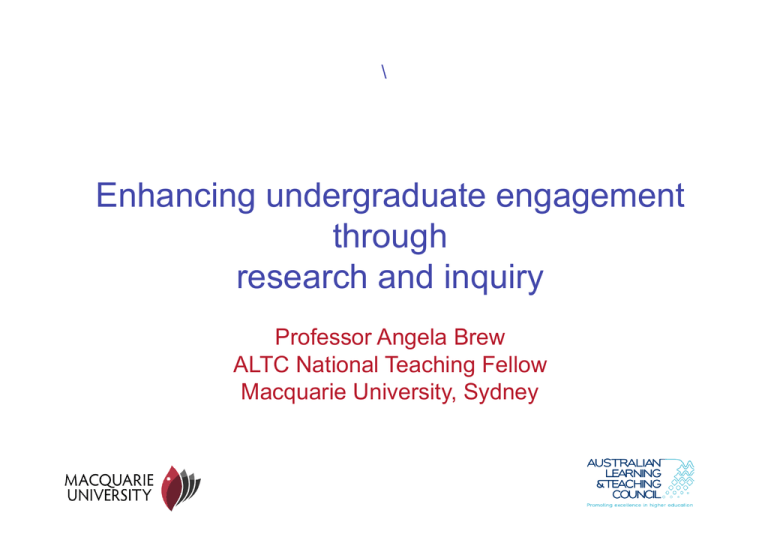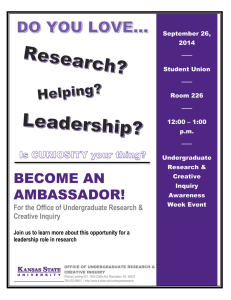Enhancing undergraduate engagement through research and inquiry
advertisement

\ Enhancing undergraduate engagement through research and inquiry Professor Angela Brew ALTC National Teaching Fellow Macquarie University, Sydney Outline Why engage undergraduates in research and inquiry? My ALTC National Teaching Fellowship Practical implications How to move this undergraduate research agenda forward 2 Why is this so important? 3 http://www.nytimes.com/2009/01/04/education/edlife/ ideas-Uno-t.html?ref=edlife New York Times article An Easy Ride Around the Crowd of Old Polluters Ben Gulak: Uno cycle 4 http:// www.nytimes.com/ 2009/01/04/education/ edlife/ideasubershelter-t.html? ref=edlife Rafael Smith: The Über Shelter 5 Why is this so important? 6 7 National documents “Public funding should be directed only to those institutions that: encourage both students and staff to engage in critical enquiry….” (Bradley Review Report page 7) "Self-fulfilment, personal development and the pursuit of knowledge as an end in itself; the provision of skills of critical analysis and independent thought to support full participation in a civil society; the preparation of leaders for diverse, global environments; and support for a highly productive and professional labour force should be key features of Australian higher education." (Transforming Australia’s Higher Education System) 8 Integrating research and teaching to enhance student engagement Positive impact on retention and satisfaction Students learn what research is and how to do it They develop a sense of professional identity Increases in self confidence Develops of advanced technical skills, problem solving, creative thinking and communication skills e. g. giving presentations Develops independent work habits Enhances teamwork and collaboration Ability to deal with ambiguity and obstacles Clarifies career goals 9 Integrating research and teaching to enhance student engagement Positive impact on retention and satisfaction Students learn what research is and how to do it They develop a sense of professional identity Increases in self confidence Develops of advanced technical skills, problem solving, creative thinking and communication skills e. g. giving presentations Develops independent work habits Enhances teamwork and collaboration Ability to deal with ambiguity and obstacles Clarifies career goals 10 Outline Why engage undergraduates in research and inquiry? My ALTC National Teaching Fellowship Practical implications How to move this undergraduate research agenda forward 11 Aim of my Fellowship To enhance student engagement in learning through supporting the development in Australia of undergraduate research and inquiry 12 Identifying national needs Study tours National documents Undergraduate research Key personnel 13 Intended outcomes Identify national needs Enhance debates concerning engagement of undergraduate students in research and inquiry Establish a set of readily available resources and protocols to bridge gaps between current and future practice Disseminate these through a website and discussions Provide the foundation for the establishment of a national centre for the integration of research, teaching and learning 14 Definition of undergraduate research and inquiry An inquiry or investigation conducted by an undergraduate student that makes an original intellectual or creative contribution to the discipline. (Beckman & Hensel, 2007) 15 Definition of undergraduate research and inquiry [An] inquiry or investigation or a research-based activity conducted by an undergraduate student that makes an original intellectual or creative contribution to the discipline and/or to understanding. (following Beckman & Hensel, 2007) 16 Tensions in implementing undergraduate research and inquiry Student, process centered Outcome, product centered 17 18 19 Tensions in implementing undergraduate research and inquiry Student, process centered Student initiated Outcome, product centered Faculty initiated 20 Who defines the question in undergraduate research? Expert researcher/ academic Student 21 Who defines the question in undergraduate research? Expert researcher/ academic Student Community 22 Tensions in implementing undergraduate research and inquiry Student, process centered Student initiated Honors students Outcome, product centered Faculty initiated All students Link 23 Tensions in implementing undergraduate research and inquiry Student, process centered Student initiated Honors students Curriculum based Outcome, product centered Faculty initiated All students Co-curricular 24 Research in the curriculum can be carried out 1. Assignments and tutorials within specific subjects 2. Whole courses or programs, for example across year levels 3. At whole of degree level e.g. PBL, IBL 25 What needs to change? Course organisation structures: from individuals to course teams Module flexibility Vertical integration Ideas about research and who is capable of doing it Teaching spaces 26 Tensions in implementing undergraduate research and inquiry Student, process centered Student initiated Honors students Curriculum based Collaborative Original to student Outcome, product centered Faculty initiated All students Co-curricular Individual Original to discipline 27 Tensions in implementing undergraduate research and inquiry Student, process centered Student initiated Honors students Curriculum based Collaborative Original to student Interdisciplinary Campus/community audience Outcome, product centered Faculty initiated All students Co-curricular Individual Original to discipline Discipline based Professional audience 28 29 Outline Why engage undergraduates in research and inquiry? My ALTC National Teaching Fellowship Practical implications How to move this undergraduate research agenda forward 30 Concluding key issues Importance of undergraduate research as a beginning preparation for research careers “The path I am setting out…raises the expectations we have of our young people and their parents and of our great institutions. It asks them to be bolder and more ambitious in what can and should be achieved” (Hon Julia Gillard MP 4th March 2009) 31 32 References used in this presentation Picture taken by Angela Brew of various covers of the magazine “New internationalist. http://www.newint.org/ Picture of Uno cycle by Ben Gulak http://www.nytimes.com/2009/01/04/education/edlife/ideas-Uno-t.html?ref=edlife New York Times article: An Easy Ride Around the Crowd of Old Polluters Uber shelter by Raphael Smith: http://www.nytimes.com/2009/01/04/education/edlife/ideas-ubershelter-t.html?ref=edlife Question mark picture: unknown internet source Hunter, A-B., Laursen, S.L., Melton, E.,Seymour, E., & Thiry, H.(forthcoming 2010). Undergraduate Research in the Sciences: Engaging students in real science. New York Jossey-Bass. Beckman, M., & Hensel, N. (no date). Defining Undergraduate research. Carnegie Foundation for the Advancement of Teaching and Learning, Leadership Project on Undergraduate Research and the Scholarship of Teaching and Learning. Undergraduate research journals including: Reinvention: the journal of undergraduate research, University of Warwick, UK, (http://www2.warwick.ac.uk/fac/soc/sociology/rsw/ undergrad/cetl/ejournal/ Nexus: journal of undergraduate science, engineering and technology (http://www.utas.edu.au/scieng/nexus/) and Ergo, Weber State University, USA. Picture of Mars Rover: From Jet Propulsion Laboratory, California Institute of Technology: mars.jpl.nasa.gov/.../20031104a.html Picture of booklets from various undergraduate conferences and colloquia taken by Angela Brew Gillard, J. (2009). Quotation from Speech 4th March. 33

